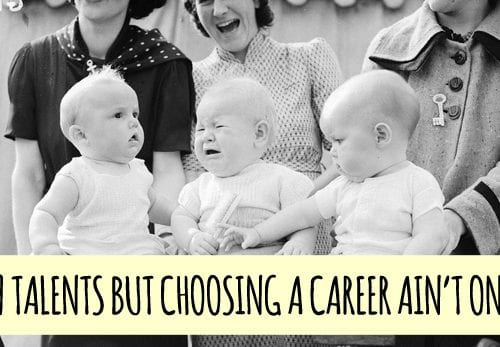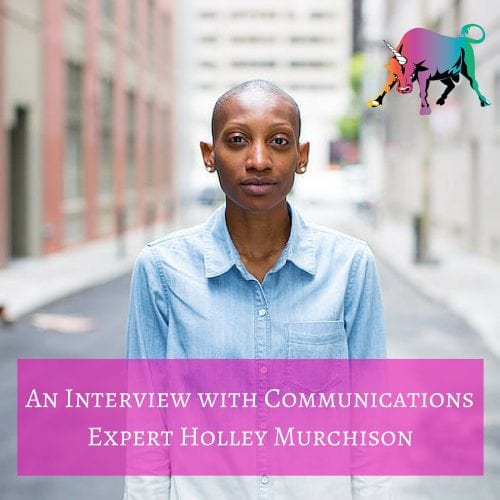
This article is more than ten years old. It originally ran on a now-defunct website called The Gloss, where Bullish got its start. This post was created entirely by humans, as AI didn’t exist back then (but also: why would you want to read something no one could be bothered to write?) For more recent posts, try here.
It’s December 30th, time for making New Years’ resolutions that will last until approximately January 13th. But seriously, just as every fitness and weight loss expert will tell you: diets don’t work; instead, you need to make lifestyle changes.
And you need to not be afraid to change your lifestyle to something drastically different than the lifestyles of those around you, whether that means making protein shakes at the office or turning at the grandmotherly hour of 9pm so you can get up at 5am and write that book you’ve been meaning to write.
A lot of career-related writing targeted towards women emphasizes work-life “balance.” So you should really take some time out and nurture yourself, right?
Actually, I’d keep that to a minimum right now. “Balance” is not for the young and sprightly — instead, think of work-life balance over the course of your entire life. Do you intend to retire some day? Would you like to have a baby and invest substantial time in caring for it? If there is some phase of your life during which you will be working 15 hours a week, then maybe you should work 60 now.
This isn’t as difficult or unreasonable as it might seem. In 168 Hours: You Have More Time Than You Think, Laura Vanderkam points out that, of the 168 hours each of us has every week, spending 56 hours sleeping and 60 hours working still leaves 52 hours left for other activities — over 7 hours per day. So, cut out all the fucking around, and you can easily step up your career and life.
Here’s what I mean by “fucking around”: I mean anything that is not extremely productive or extremely pleasurable. For me, that happens when I feel like I’ve been online long enough to read everything interesting … and yet I am still on the internet. Or when I am on the train and have read all the guilty-pleasure articles and find myself perusing announcements about the weddings of actors on shows I have never watched.
If it isn’t extremely productive or extremely pleasurable, just stop. Either eat something healthy that takes five minutes, or have a huge decadent meal with friends for two hours. Either go to the gym and work every fucking muscle in your body like an Olympian, or stay home and find someone to make out with.
If your job requires you to attend pointless meetings, either find a way out (“Dear boss, would you like me to attend this meeting or finish this project before the close of business?”), or use the pointless meeting to your own ends, setting your own private goals: make an ally, impress someone it would be worth impressing, be so prepared that everyone can easily see you in a more responsible position. Treat the pointless meeting like a job interview for the next-best job. Make your commute less of a slog by finding a way to make it productive or pleasurable — either way. Make a list of all your forms of recreation, and kill off the least pleasurable ones. Is looking at Modcloth dresses you can’t afford as fun as eating chocolate in the bathtub? Why play Farmville when you could be trying new sexual positions and photographing the results for nostalgic reminiscence when you are elderly?
Cutting out the fucking around and devoting that time to work actually is balanced, if you think of your life as a bell curve — you spent childhood not working, you will likely spend old age not working; there will be some decline of work if you have children, or have to care for aging parents, or when you simply suffer the slings and arrows of your own aging process.
Female fertility is seriously reduced at age 35. If you want to have a baby, you should make every effort to do it before then (remember, for every happy 39-year-old mom you know, there is someone else stabbing herself in the stomach with expensive hormone injections; people just don’t talk about that as much). If your ability to produce income will be seriously reduced at that time, count backwards: you have 13 years, max, between the end of college and the end of a safe window of fertility. Sites like Guru and Elance are full of moms looking for a way to make money part-time from home; many of them are offering to be your virtual assistant, competing with people in India charging $5 an hour. The prospects are not great. If you want to work part-time from home, best to set that up before you get pregnant. You need to be so in-demand that reducing the supply of your labor actually drives up prices; you want your skills to be so valuable to others that people will take whatever small slice of you they can get, even if it means you work online in the middle of the night when your kid’s asleep.
A thirteen-year span during which you are supposed to both launch and peak is simply no time for scaling back or fucking around.
If you attended a competitive college in the last fifteen years, you probably worked seriously hard as a young person in order to make that happen. You probably had the foresight to realize that parties you didn’t attend, drugs you didn’t try, social scenes and squabbles you didn’t become invested in, would redound to your later success. As a teenager, I knew I had to get the hell out of Virginia, at any cost. I applied to one hundred and twenty five scholarship competitions. I stopped looking in mirrors; I let my teenage acne run unabated. I ignored people whose concerns did not extend in time or space outside the walls of a high school. I figured there would be time later for looking pretty and maintaining friendships with more interesting people I would go on to meet in some future, better life. The more gushy messages in your yearbook, the more time you probably should’ve spent studying. Working incredibly hard and denying pleasures in high school has an exponential effect on the rest of your life; why would your twenties not have the same effect on your forties?
In some ways, stepping up your working life is actually easier than scaling back. If you only exercise one hour a week, it seems like a waste of time, because that’s not enough exercise to make a big difference in your health or appearance. It’s actually easier to exercise an hour a day than an hour a week, because at the hour-a-day level, you definitely see results — and you see that stopping would cause you to lose those results. At an hour a day, you feel like you’re competing at something and winning.
Similarly, did you ever notice that it’s actually harder to lazily drag yourself up the subway steps than it is to think of the stairs as exercise and jet up them in a focused way? Lazy is draining; it only makes you lazier. Similarly, work — any kind of work — is so much harder when you tune out on your way there, listening to your iPod and wishing you were elsewhere. Going balls-out for a fifty-hour week, cultivating an obsession with what you do, is so much easier than dragging your sorry ass in to a job in which you are only partially engaged.
So, rather than making New Years’ resolutions, how about this — three questions to ask in order to make stepping it up a sustainable part of this phase of your life:
1. What is the most painless way to fit in ten more productive hours per week? Where can you schedule an extra session and not resent it? Do you work at a job where, for the first two hours, everyone just checks email and wanders around like zombies? Can you redeem that time, such as by getting up earlier, using your commute time to psych yourself up, and then slamming out something important in the morning — or, if your job truly is a pointless endeavor, can you use that time for something else (without getting fired)? What unpleasurable, time-sucking fucking around can you cut out of your life and not miss? Can you take twelve hours of slightly-pleasurable CSI-and-Kardashian-watching and replace it with two hours of petting adorable kitties and then drinking Scotch, thus saving ten hours while still effecting a net increase in pleasure? How about doing something productive every Saturday from 5-7pm, when it’s kind of lame to be out, and when you know you will immediately reward your hard work with socializing and booze?
2. How can you best spend this extra time? When I say you should work more at this phase of your life, I don’t necessarily mean that you should give this time to your boss, unless there is a direct way to make gains in this manner in your current position. I mean that you can’t just have a job anymore. I mean that you should use these hours to write a book. Or to learn a new skill. Or to read books in your field and write commentary on them, and then send this out as an email newsletter, or write for or create a blog in your industry. Or you should volunteer somewhere in a way that also bolsters your resume and network, such as by gaining fundraising, event planning, or PR experience with a nonprofit. The more you become engaged in your field outside of your job, the more you keep your company engaged in the need to continually pursue you and keep you satisfied (like when you lose weight or buy a new wardrobe while you’re in a relationship, and your partner gets a little scared). The more you are a professional in your field rather than just an employee, the more your boss begins to see you as a peer, and the more job or freelance offers will simply drop into your inbox, even when you’re not looking.
3. How can you make this extra work pleasant? Personally, I put an outdoor desk on my balcony (see photo above — obviously taken pre-blizzard). That was a bit pricey, of course (my having a balcony is a direct result of the financial crisis and the concomitant drop in Wall Street rents). But when I lived in a decrepit apartment in East Harlem and made $17,000 a year, I bought a $3 plastic tub at the corner store and would fill it with hot water and bath salts and soak my feet in it while I sat at my desk. Also, fun fact: champagne doesn’t actually cost more than regular wine. You can soak your feet and drink champagne while you work for less than $10, all-inclusive.
So, when I talk about working more, I am not suggesting, if you sit in an awful cubicle full of distractions, that you extend your cubicle-sitting time into the evening. Think of something else. There is no virtue in suffering for its own sake.
Last time I had a full-time job, our office was near a public library, and I managed to abscond there for two-hour stretches (“Just two more solid hours and I can finish this for you — I’m going to sit at the library and come back when this is done”). If you can abscond and come back with results, you will condition your supervisors to encourage more of this from you. In The 4-Hour Workweek, Tim Ferriss suggests using illness as a way to introduce telecommuting — when you’re sick (or pretending to be), suggest to your boss a single day of working from home, then make sure to get more done that day than you ever have before. Then suggest that, since your working from home benefits everyone, that you do it every Friday (then make sure your Fridays are more productive than any other day). Then suggest Thursday and Friday. Etc. Once you are untethered, extra work can become very pleasant. (Of course, if you are already a freelancer, or your “extra work” is extracurricular, then this is easy).
I am writing this column from a cafe in Quito, Ecuador. I am here for a month, as I have a book contract, and can write test prep manuals from anywhere. This is not my first working vacation. Two years ago, I absconded to Buenos Aires, and made a profit on a month-long trip. Work does not have to take the form of sitting in place for pay. Work is anything that produces a satisfying end product that other people find valuable. You’re allowed to enjoy it.
Last month, after I wrote the column Gratitude is Nice, But Don’t Let It Keep You From Action, a commenter wrote, “You are fairly clever, Jen. But I wonder how peaceful you can be. What are you going to remember about this life when it’s almost over? What is the meaning of life?” Please allow me to plagiarize myself:
There are seasons for all things, Mike, and Bullish is intended for the young, or those who feel young. Indeed, it is those with a hot-blooded ambition in their veins who spend decades building something — a company, a family, a philanthropic boon, a life truly greater than that their own parents could have imagined for them — and thus have something actually relax from in later seasons. Ever have a truly great night of sleep after a day chopping wood, or hiking the Appalachian Trail? Life is like that. There will be a winter in your life and a winter in mine — perhaps sooner than we think — and we will have no choice but to slow down. I want us all to experience our later years with a gratified sense of contentment and security. You have to earn those things. Now.
Thanks for the column idea, Mike. I’d also suggest checking out Laura Vanderkam’s 168 Hours: You Have More Time Than You Think. Finally, I hope this column will help you step it up, enjoy your work, and live a little better in the decades to come.









